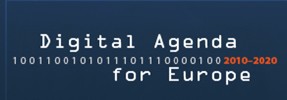
The work of the European Union on internet governance is strongly related by the overarching themes and policy initiatives around economic integration, the single market and the four freedoms of the Union — the free movement of goods, capital, services, and people.
The Digital Agenda is one of the key documents of the EU and is described as “Europe’s strategy for a flourishing digital economy by 2020.” Starting from the assumption that the free flow of online services is still blocked by too many barriers, the Digital Agenda aims to update the single market rules of the European Union for the digital era. It sets out and defines in total 100 actions for eight pillars:
Digital Single Market | Interoperability and Standards | Trust and Security | Very Fast Internet | Research and Innovation | Enhancing E-Skills | ICT for Social Challenges | International Dimensions
The Council of the European Union, the European Parliament and the European Commission have adopted a number of declarations, directives, recommendations and frameworks related to internet governance, among them:
Communications
- Communication (2011) 287 (pdf) on a single market for intellectual property rights
- Communication (2011) 222 (pdf) on the open internet and net neutrality in Europe
- Communication (2010) 609 (pdf) on a comprehensive strategy on data protection in the European Union
- Communication (2010) 472 (pdf) on European broadband – investing in digitally driven growth
- Communication (2010) 245 (pdf) on a digital agenda for Europe
- Communication (2009) 532 (pdf) on copyright in the knowledge economy
- Communication (2009) 277 (pdf) on internet governance: the next steps
Directives
- Directive 2010/13 (pdf) on the provision of audiovisual media services
- Directive 2006/24 (pdf) on the retention of communications traffic data
- Directive 2002/58 (pdf) on privacy and electronic communications
- Directive 2002/22 (pdf) on universal service and users’ rights relating to electronic communications networks and services
- Directive 2002/21 (pdf) on a common regulatory framework for electronic communications networks and services
- Directive 2002/20 (pdf) on the authorisation of electronic communications networks and services
- Directive 2002/19 (pdf) on access to, and interconnection of, electronic communications networks
Resolutions
- European Parliament Resolution 2010/66 on a new digital agenda for Europe: 2015.eu
Recommendations
- Recommendation 2006/952 (pdf) on the Protection of Minors and Human Dignity
Reports
- European Digital Competitiveness report (2010): Volume 1 – Main report (pdf) and Volume 2 – Country profiles (pdf)
- Background reports on the economic impact of ICT (pdf) and the social impact of ICT (pdf)
The legislative and political work of the EU on digital governance is complemented by initiatives on media literacy, user rights, e-safety, e-health, e-government, e-inclusion as well as a wide range of research projects that are organised in four different strands.
The European Union’s work on internet governance is coordinated by the EU Digital Agenda Commissioner Neelie Kroes and her team.